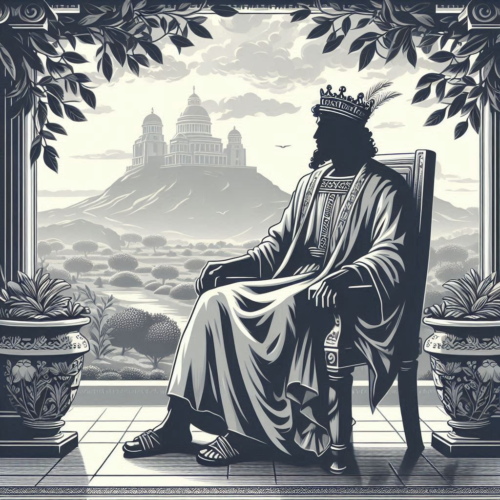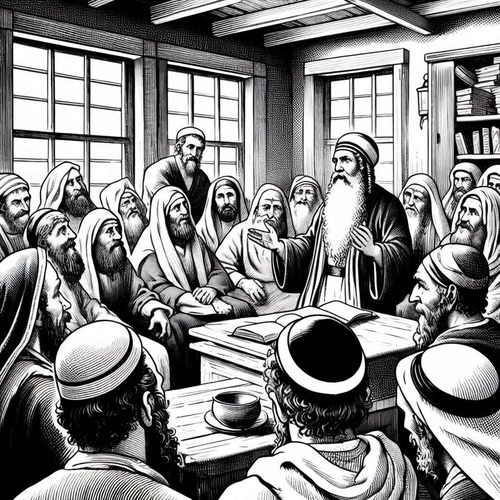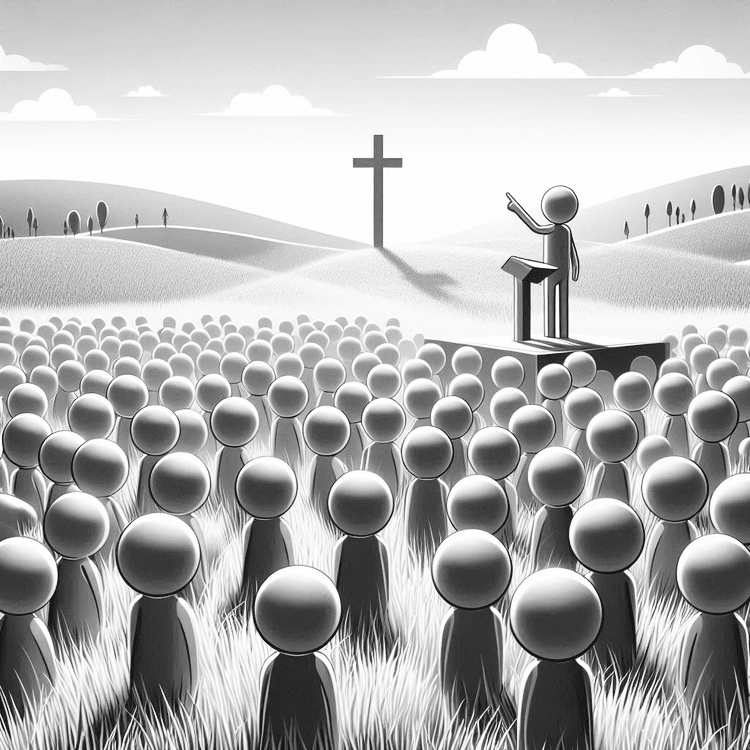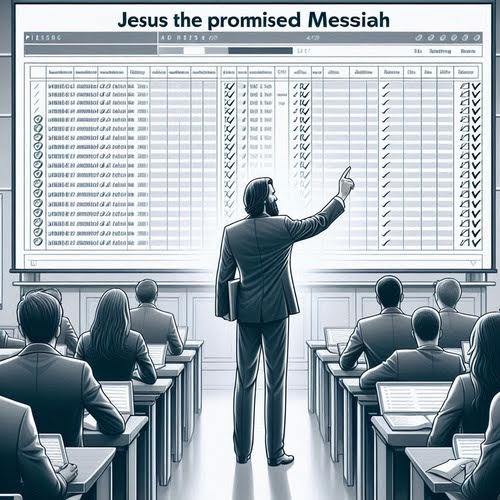Mystery Man Melchizedek: How Does He Foreshadow Christ?
In the vast narrative of Scripture, few figures emerge as mysteriously or disappear as swiftly as Melchizedek does. His brief appearance in Genesis 14 spans just three verses, yet the enigmatic priest-king casts a shadow that stretches across the entire Bible narrative, reaching its fulfillment in Jesus Christ. Who was this mysterious figure who blessed Abraham, and why does Scripture present him as a crucial preview of our Saviour?
FIRST, THE HISTORICAL ENCOUNTER
The story unfolds against the backdrop of warfare in the ancient Near East. Abraham (then still called Abram) had just returned victorious from rescuing his nephew Lot, defeating a coalition of kings in the process. It’s at this pivotal moment that Melchizedek suddenly appears on the pages of Scripture.
“Then Melchizedek king of Salem brought out bread and wine. He was priest of God Most High, and he blessed Abram” (Genesis 14:18-19). In this brief encounter, we see three remarkable elements in Melchizedek:
- His dual office as both king and priest—he ruled Salem (later Jerusalem) while serving as priest of El Elyon (God Most High).
- His bringing forth of bread and wine—elements that would later take on profound significance in Christ’s ministry.
- His blessing of Abraham, followed by Abraham’s offering of a tenth of everything.
This wasn’t merely a chance meeting between two ancient figures. The significance of a priest-king blessing the patriarch of God’s chosen people cannot be overstated. Abraham, who received God’s covenant promises, here acknowledges someone greater than himself by receiving his blessing and offering him a tithe.
NEXT, THE PROPHETIC DECLARATION
Centuries later, David penned words that would endorse the eternal significance of Melchizedek’s priesthood. In Psalm 110, a clearly messianic psalm, we read: “The LORD has sworn and will not change his mind: ‘You are a priest forever, in the order of Melchizedek’” (Psalm 110:4).
The divine oath reveals something remarkable. Consider these facts about Melchizedek’s priesthood:
- His priesthood was distinct from that of the Levitical clan—his preceded it and would ultimately supersede it.
- His priesthood was no temporary arrangement, but an eternal office
- He pointed to an eternal priest-king who would unite both roles perfectly.
FINALLY, THE NEW TESTAMENT’S REVELATION
The book of Hebrews provides our fullest understanding of Melchizedek’s significance, dedicating substantial attention to him in chapters 5-7. The author presents a carefully reasoned argument for the superiority of Melchizedek’s priesthood over that of the Levitical clan.
Consider the stunning parallels drawn in Hebrews 7. Melchizedek’s name means “king of righteousness,” and his title “king of Salem” means “king of peace.” He appears in Scripture without genealogy—with no record of father or mother, and no beginning or end of days. While this doesn’t mean he was literally eternal, the Holy Spirit inspired the Genesis account to present him this way, creating a deliberate picture of an eternal priest.
This description points unmistakably to Christ. Sample these facts:
- Like Melchizedek, Jesus unites the offices of king and priest.
- Like Melchizedek, His priesthood isn’t based on ancestral lineage but on the power of an indestructible life.
- Like Melchizedek, He ministers eternally on behalf of His people.
The author of Hebrews argues the ancient encounter between Melchizedek and Abraham demonstrated the superiority of Christ’s coming priesthood over the Levitical system. When Abraham paid tithes to Melchizedek, it symbolically represented the entire Levitical priesthood (still in Abraham’s loins, so to speak) acknowledging the superiority of Melchizedek’s priesthood. This previewed how the old covenant priesthood would ultimately give way to Christ’s superior, eternal priesthood.
THEOLOGICAL IMPLICATIONS
The eternal nature of Christ’s priesthood means we have an unchanging mediator who continually intercedes for us. Unlike the Levitical priests who served and died, Christ’s priesthood continues forever, ensuring His people always have an advocate before the Father’s throne.
The superiority of the New Covenant is demonstrated through Christ fulfilling and surpassing Melchizedek’s pattern. Where the old covenant required repeated sacrifices and a succession of priests, Christ’s single sacrifice and eternal priesthood brings complete atonement.
The perfection of Christ’s mediatorial office unites what was divided under the old covenant—He is both the perfect king who rules and the perfect priest who intercedes. Just as Melchizedek united these offices in a shadow form, Christ perfectly embodies both roles, ruling with righteousness while representing us before God.
How this impacts our understanding of salvation is profound—we see God had planned all along for a better priesthood than the Levitical system. The appearance of Melchizedek before the establishment of the Levitical priesthood shows God always intended something greater than the temporary system given through Moses.
APPLICATION FOR TODAY’S BELIEVERS
We Have an Eternal High Priest: Having Christ as our eternal high priest means we can approach God’s throne with confidence at any time. When we struggle with sin or doubt, we don’t need to find a human mediator—we have direct access to the Father through Christ who ever lives to make intercession for us.
We Have the Assurance of Perfect Mediation: This brings deep comfort in our daily walk. We don’t have to wonder if our prayers are good enough or if we’ve performed the right rituals—Christ’s mediation is perfect and complete. His understanding of both divine holiness and human weakness makes Him the perfect advocate for His people.
We Have Certainty of Salvation: Our assurance of salvation rests not on our performance but on Christ’s continuing priestly work. Just as Abraham received blessing through Melchizedek’s priesthood, we receive blessing through Christ’s greater priesthood—not because we deserve it, but because our great high priest secures it for us.
We Have Rest in the Completeness of Christ’s Work: We can rest in His finished sacrifice while also trusting in His ongoing intercession. Unlike the old covenant priests who had to repeat their sacrifices day after day, Christ’s one sacrifice and continuing priesthood provide everything we need for life and godliness.
CONCLUSION
The figure of Melchizedek is a masterful brushstroke in God’s grand portrait of redemption. The mysterious priest-king who blessed Abraham wasn’t merely a historical curiosity but a divinely placed signpost pointing to the perfect priesthood of Jesus.
Spare a thought for the beauty in the Bible’s typology: Just as an approaching shadow hints at the shape of things to come, Melchizedek’s unique priesthood outlined the contours of Christ’s superior ministry. That God would plant such clear pictures in Genesis, illuminate them through David’s psalms, and finally explain them fully in Hebrews demonstrates the magnificent unity of Scripture. This wasn’t coincidence or clever human interpretation—but divine intention from the beginning.
Christ is the fulfillment of all Scripture, and nowhere is this clearer than in His relationship to Melchizedek’s priesthood. Every detail of that ancient encounter in Genesis—the blessing pronounced on Abraham, the bread and wine, the combination of royal and priestly offices—finds its perfect expression in Jesus. He is the true King of Righteousness and Peace, the eternal priest who blesses God’s people not with temporary provisions but with eternal salvation.
Mystery Man Melchizedek—Related FAQs
Was Melchizedek a Christophany—a pre-incarnate appearance of Christ? While some early church fathers and theologians have suggested this, most Reformed scholars view Melchizedek as a historical figure who served as a type of Christ rather than Christ Himself. He was a real priest-king whom God sovereignly positioned to foreshadow Christ’s greater priesthood. The description in Hebrews 7 speaks of him as being “like” the Son of God rather than being the Son of God.
- Did any notable Puritan or Reformed theologians believe Melchizedek was a Christophany? Jonathan Edwards suggested this possibility in some of his writings, though he wasn’t dogmatic about it. However, John Calvin, along with most Reformed theologians, maintained Melchizedek was a historical figure distinct from Christ. Calvin emphasised Melchizedek’s significance lay in his role as a type, rather than in his personal identity.
- Why exactly was Melchizedek’s priesthood superior to the Levitical priesthood? His priesthood was superior in several ways: it predated the Levitical priesthood, it received tithes from Abraham (and thus symbolically from Levi), and it was established directly by God without genealogical requirements. Moreover, Melchizedek’s priesthood combined both royal and priestly offices, something the Levitical system kept strictly separate.
Why does the specific order of priesthood matter so much? The order of priesthood matters because it determines the basis and nature of our approach to God. The Levitical priesthood was temporary, inherited, and required repeated sacrifices. The order of Melchizedek, being eternal and based on God’s direct appointment, provides the perfect pattern for Christ’s permanent, effective priesthood.
- How does Melchizedek relate to God’s covenant promises? Melchizedek’s appearance to Abraham occurs in the context of God’s covenant promises. His blessing of Abraham affirmed God’s promises to the patriarch and previewed how the ultimate fulfillment of these promises would come through a greater priest-king. This shows the unity of God’s covenant purposes from Abraham through to Christ.
- If Melchizedek wasn’t a Christophany, why does Scripture say he was “without father or mother”? This description refers to how Melchizedek appears in the biblical narrative, not his actual biography. Unlike other significant biblical figures, his genealogy is deliberately omitted to create a theological picture of an eternal priesthood. This literary device serves to highlight how his priesthood transcended normal genealogical requirements.
How do we reconcile Melchizedek being both a historical figure and a type of Christ? God sovereignly worked in history to provide living pictures of Christ’s coming work. Just as David was both a real king and a type of Christ’s kingship, Melchizedek was both a real priest-king and a divinely appointed type of Christ’s eternal priesthood. This demonstrates God’s providence in preparing His people to recognise and understand Christ’s ministry.
Mystery Man Melchizedek—Our Related Posts
Editor's Pick
SUPPORT US:
Feel the Holy Spirit's gentle nudge to partner with us?
Donate Online:
Account Name: TRUTHS TO DIE FOR FOUNDATION
Account Number: 10243565459
Bank IFSC: IDFB0043391
Bank Name: IDFC FIRST BANK






